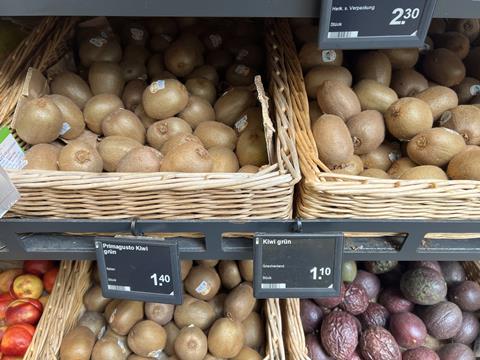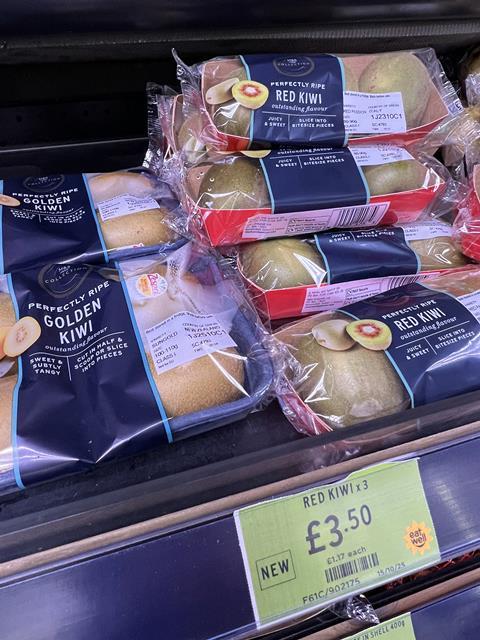Kiwifruit industry’s recent expansion in Europe has brought it to decisive moment, one where future viability is at stake, says Marco De Nadai
The kiwifruit industry in Greece and Italy has reached a decisive point. Production volumes continue to grow, yet this growth risks losing meaning if it is not supported by a clear, ethical, and coordinated strategy across the entire supply chain.
Too often, the pursuit of immediate advantage replaces long-term vision, and this short-sightedness is eroding the foundations of the sector. Sustainability doesn’t depend only on how much we produce, but on how responsibly we operate.
In recent seasons, some buyers in the fields have adopted an aggressive approach, doing whatever it takes to secure the volumes they need. This may guarantee short-term supply, but it damages everyone in the long run.
When market logic is replaced by speculation, the result is an artificial system, inflated prices, false expectations, and a market that loses touch with real demand.
This not only weakens the competitiveness of the Greek and Italian kiwifruit business, but also undermines trust between growers, packers, and international clients.
Coherence and intellectual honesty must therefore become shared principles, not optional values. Every link in the chain has a role to play in keeping the system balanced and credible.

False signals, fragile market
When the price at farm level no longer reflects what the market can sustain, exporters and distributors are squeezed between inflated costs and limited margins. This imbalance weakens the entire network and creates the illusion of prosperity where, in fact, fragility is growing.
A healthy market needs real signals – prices aligned with quality, costs, and consumer demand. Anything else is a temporary illusion that risks collapsing under its own weight.
The future of the kiwifruit sector depends on the ability to act together. Synergy creates value added, through shared strategy, mutual respect, and a common vision.
Division, on the other hand, opens the door to instability and control by a few. This confirms the old Latin adage: dividi et impera.
Those who truly believe in the future of the sector must move in the opposite direction: toward integration, transparency, and cooperation.
Only through collective strength can Greece and Italy remain credible players in the global kiwifruit market, capable of competing with emerging origins that are growing fast and strategically.

A strategic call to action
Now is the time for a mature, coordinated approach, one that protects the value of the product, strengthens trust, and ensures real competitiveness in global markets. The kiwifruit sector cannot afford to build its future on opportunism or artificial growth.
Integrity, collaboration, and realism are the only strategies that guarantee stability, profitability, and global respect for European kiwifruit.
Kiwifruit production in Greece and Italy has grown significantly in recent years, yet this volume increase has not translated into a balanced and sustainable economic model.
Farm-gate prices continue to rise, often disconnected from real market dynamics and consumer purchasing power, creating a growing gap between perceived and actual value.
And while production costs did not increase as much as the kiwifruit prices in the farms, prices demanded by growers often exceed what the market can absorb.
This imbalance threatens the long-term stability of the sector, particularly for exporters and distributors, and risks disrupting the commercial networks connecting producers to global markets.
Variation in cultivation practices, harvest timing, and post-harvest handling leads to uneven fruit quality, affecting storability and market performance.
The emergence of Moria symptoms further underscores the need for coordinated action among growers, agronomists, and research institutions.
It’s essential that we improve farm management, from nutrition and irrigation to optimal harvest maturity, so we safeguard orchards and ensure consistent quality.
Operators are under increasing pressure to maintain client commitments despite unsustainable prices. But premature or even illegal harvesting, often driven by speculation, damages the sector’s reputation, misleads buyers, and undermines honest growers.
We have to uphold our integrity and respect harvest regulations, to protect both market credibility and the long-term future of kiwifruit production.

Shared responsibility
Sustainable growth requires fairness and transparency along the supply chain, and collaboration that creates genuine win-win situations and therefore benefits all stakeholders.
Short-term speculative gains may offer temporary advantages, but over time they erode trust, weaken trade relationships, and harm the product’s reputation.
Only through ethical conduct, realistic pricing, and shared responsibility can the kiwifruit sector secure a sustainable, competitive, and respected future.
Marco De Nadai is the licensor of Red and Gold Passion kiwifruit varieties and a kiwifruit exporter to markets worldwide.



